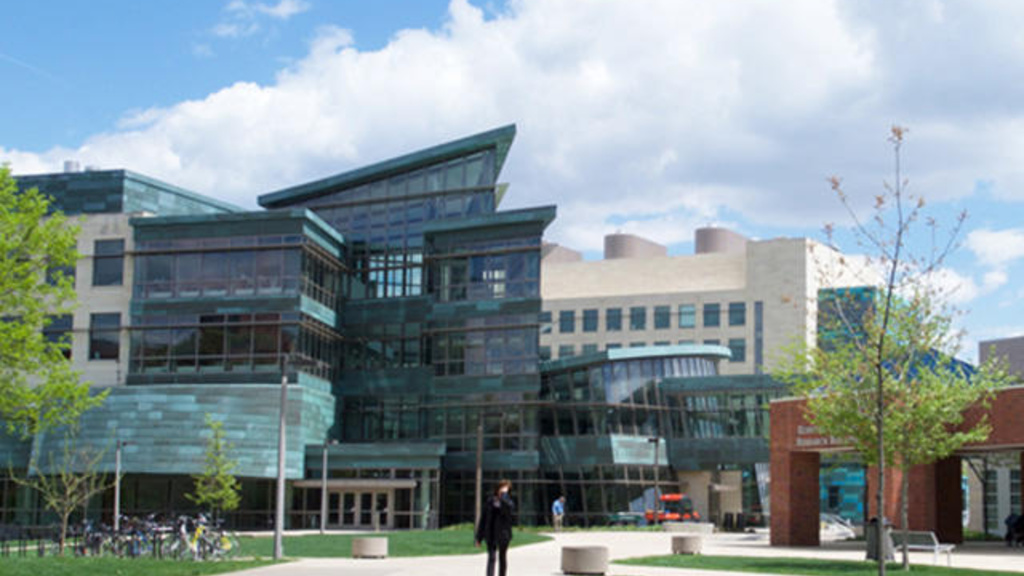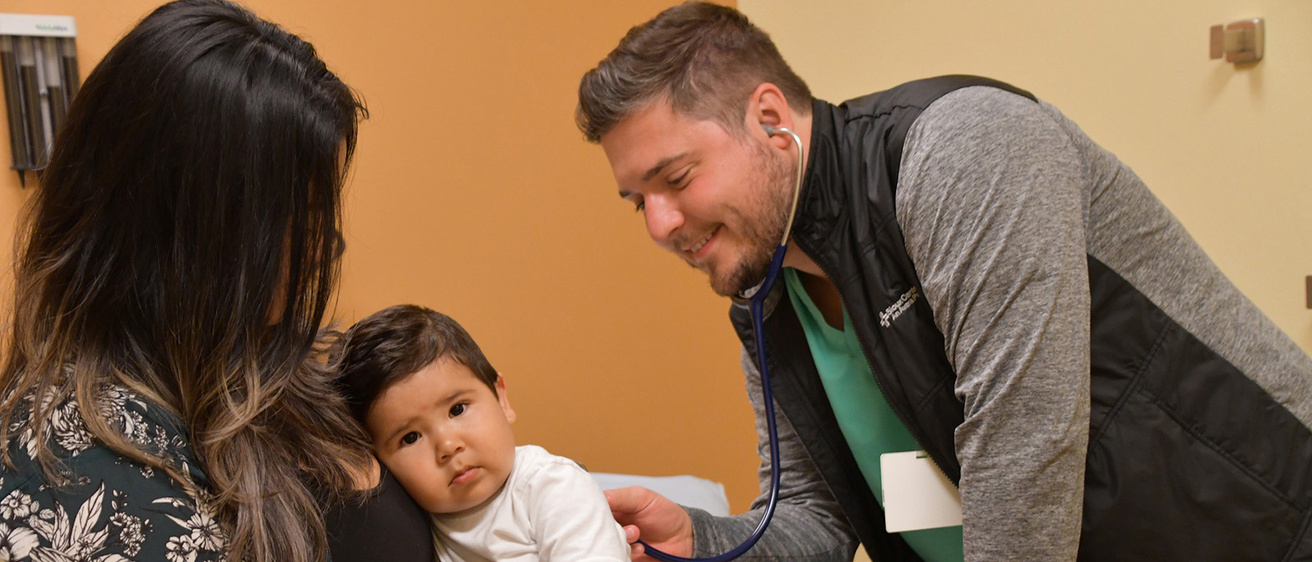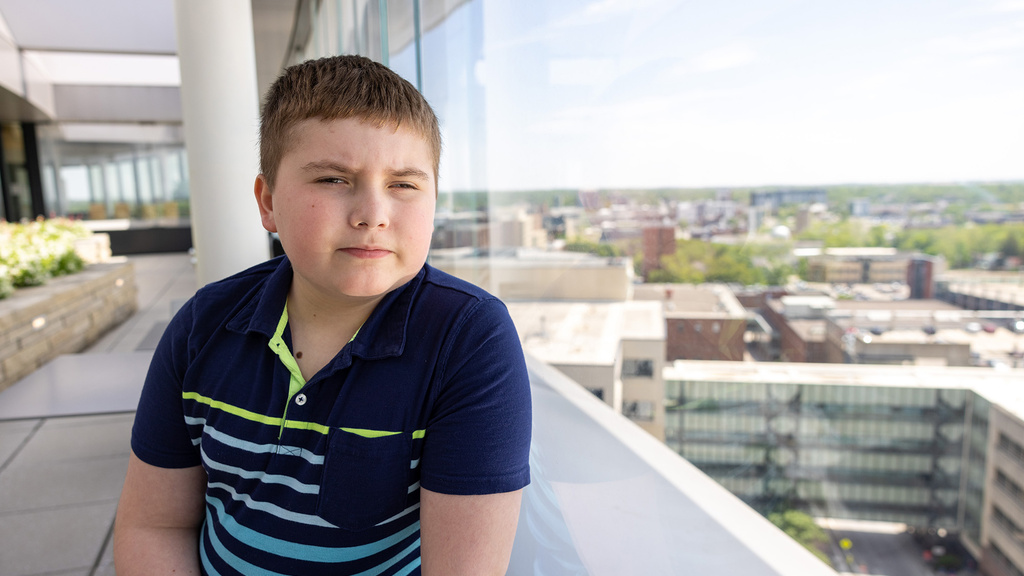David Janssen graduated from the University of Iowa with a medical degree and returned to his roots in northwest Iowa to practice family medicine. He says his goal is to take care of residents, so the community can thrive.
Story: Richard C. Lewis
Photography: courtesy of David Janssen
Published: June 20, 2022
Sometimes, it’s an unexpected assist that makes you grateful to have returned home.
That’s what happened to David Janssen, a family medicine doctor in Sioux Center, Iowa. After working a late shift at the hospital, Janssen awoke with a start one morning when he heard noise above him. When he investigated, he found his neighbor removing leaves from his roof.
“We had talked a few days ago about raking leaves together, but I didn’t realize it would happen then, and he would be on my roof,” Janssen says.
“He is one of my best friends now,” he adds with a laugh.
For Janssen, a University of Iowa Carver College of Medicine graduate, the selfless deed crystallized why he decided to become a family medicine physician and to practice near where he grew up.
“My patients, on their best day or their worst day, I can take care of them,” he says. “I want to help the community. If we take care of everyone, the community thrives.”
Janssen grew up in Hospers, a small town in northwest Iowa about 20 minutes from Sioux Center. He attended high school in Orange City, a similar distance from his hometown.
His parents moved to town when Janssen’s father accepted a call to be pastor at First Presbyterian Church of Hospers. His mother was a teacher and managed the family’s affairs.
Janssen was born in Sioux Center, and works with some of the nurses involved in his birth and his post-delivery care. He spent summer days as a lifeguard at the pool, the main hangout place for him and his friends. The family routinely convened for evening supper.
“I think it really was a quintessential small-town experience,” Janssen recalls. “Kids go out during the summer, stay outside all day, and don’t come home until supper.”
“I think my education at the University of Iowa taught me to meet people where they are, which I consider one of the core principles of family medicine. We take care of our patients, knowing that they will make the choices that they would like to make, but we as doctors make sure they’re fully informed.”
The idyllic childhood aside, when it came time to choose a college, Janssen sought distance, attending Grove City College in western Pennsylvania, from which he earned degrees in molecular biology and Spanish.
As he considered medical schools, Janssen cast a broad net: He applied to about a dozen schools, from Columbia University on the East Coast, to Creighton University in the Midwest. Janssen included Iowa on his list, although he didn’t know much about its medical program.
“I didn’t know too much about Iowa per se, other than it’s in my home state,” Janssen says. “In-state tuition was certainly a consideration.”
He accepted an invitation to visit campus—and everything changed.
“When I interviewed at Iowa, I was very impressed by the professionalism of the day,” Janssen recalls. “Everything was seamless, the campus looked great, everyone whom I met was very polished and up to speed. It just seemed like a wonderful place to get a medical education.”
“It felt right to be back in Midwest, and I felt a sense of belonging,” Janssen continues. “And when I looked at the location, the curriculum, the emphasis on family medicine, and being close to home—all those factors—it just made sense.”
Before he stepped on campus, Janssen planned on being a family doctor. His first year, he was elected class president of the Family Medicine Interest Group, a student group within the Carver College of Medicine. He completed rotations in family medicine and attended a yearly conference in Kansas City for medical students and residents devoted to best practices in the field.
“Growing up in small-town Iowa, we don’t have other types of doctors. So, when I thought about being a doctor, it was family medicine,” Janssen says. “I never really wanted to be anything else.”
Jill Endres, clinical professor in the Department of Family Medicine at Iowa, says Janssen and family medicine are an ideal match.
“David entered medical school with the heart of a family doctor,” Endres says. “He committed himself to his studies, to his medical student community, and to his patients. I never had any doubt that he would become a beloved family doctor in his hometown area, and that is exactly what he did.”
Janssen’s practice is with Sioux Center Health, a multifaceted complex that includes a hospital, medical clinic, nursing home, assisted living, preschool, and day care. He arrived in 2018, and currently is president of the medical staff.
About half of his patients are native Spanish-speakers, drawing from two main immigrant communities in Sioux Center—a long-established group from Mexico and more recent arrivals from Guatemala. Janssen is thrilled to have them as patients, as he draws on his fluency in Spanish and his knowledge gained by working at a medical clinic in Guatemala while in medical school.
A Spanish-speaker’s first visit is usually interesting, he says, because the patient invariably brings family, or friends, to help navigate language and the vast differences in health care terminology and systems.

Medicine at Iowa
The Roy J. and Lucille A. Carver College of Medicine is a highly ranked medical school where students learn to become accomplished clinicians and top-flight researchers and educators. Students come to Iowa to study medicine in a program that uses case-based learning as the basis of their education.
Janssen makes it a priority to help these patients feel at home, conversing with them in Spanish and keeping his explanations about their conditions concise and easy to understand. That builds trust.
“It’s rewarding to see them come back several months later, and they come by themselves,” Janssen explains. “They know they’ll be able to come into the building, speak with someone who understands them, they feel safe, and that they can seek care without worrying about anything else.”
Janssen says it’s the personal approach to care—along with educating his patients about how to better care for themselves — that made him want to become a physician.
“I think my education at the University of Iowa taught me to meet people where they are, which I consider one of the core principles of family medicine,” he says. “We take care of our patients, knowing that they will make the choices that they would like to make, but we as doctors make sure they’re fully informed.”



